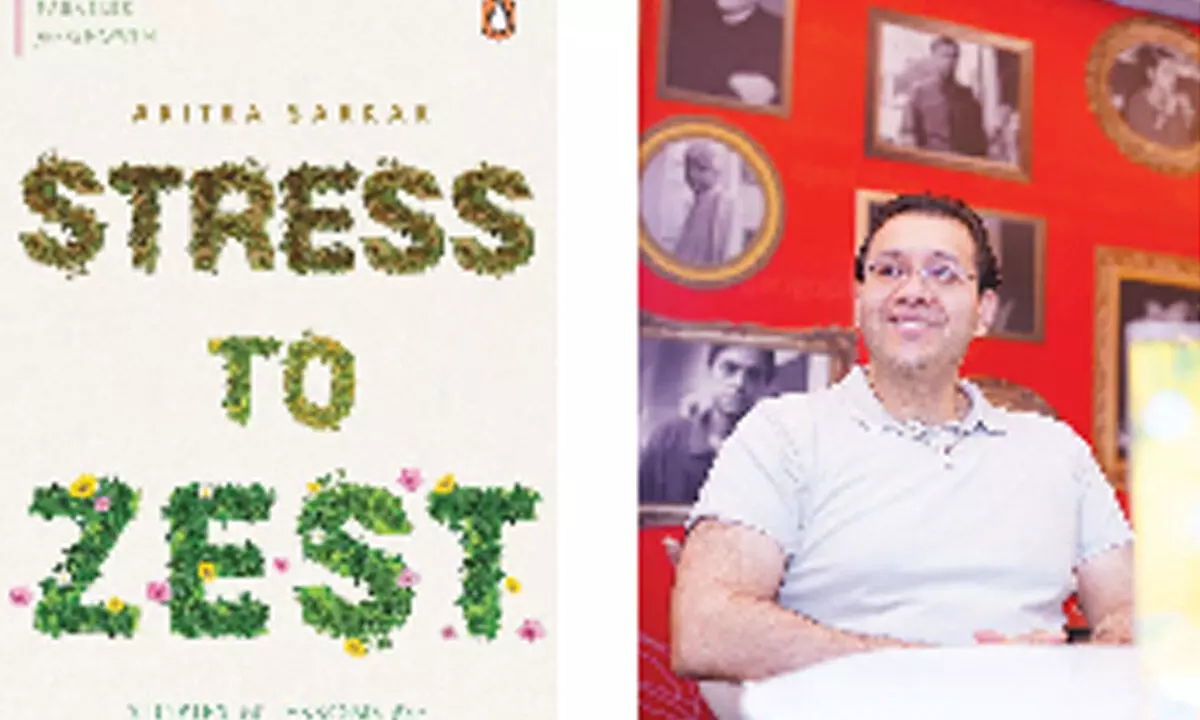Transforming stress into personal growth

In his latest book, ‘Stress to Zest,’ author and thought leader Aritra Sarkar explores stress management through a unique storytelling approach that resonates deeply with readers.
In his latest book, ‘Stress to Zest,’ author and thought leader Aritra Sarkar explores stress management through a unique storytelling approach that resonates deeply with readers. Inspired by the challenges he faced during the pandemic, Sarkar used storytelling as a coping mechanism, which led to his podcast and eventually the book. He describes it as a resource for those seeking long-lasting, transformative solutions rather than quick fixes. “Storytelling became my way of coping, offering a path through the pain I was experiencing,” Sarkar shares. This approach helped him realize that stress is experienced differently by everyone, and this understanding shaped his holistic approach to stress management.
Sarkar’s perspective differs from traditional methods by focusing on relatable narratives. Rather than relying on statistics, he uses fictional characters to depict real-world scenarios, aiming to touch the soul rather than just the mind. “The subtle objective is for readers to find inspiration in these stories and recognize they are not alone in their challenges,” Sarkar explains. He believes that this storytelling method allows readers to connect with characters on a personal level, making the lessons more impactful and memorable.
In ‘Stress to Zest,’ fictional narratives act as case studies, illustrating stress management strategies through character journeys from pain to positivity. Readers can see themselves in these characters, learning valuable techniques as they witness each protagonist’s transformation. “If you’re dealing with a similar type of stress, you’ll likely see yourself in these characters and can draw practical lessons from their strategies,” he says.
Crafting relatable stories and characters was a natural process for Sarkar, who has a background in storytelling and has previously written the graphic novel Goliath of Shenzhen. His characters are imbued with traits from his own life, enabling him to create authentic narratives that reflect real struggles. “To create the characters, I drew from my own experiences, giving them traits, strengths, and flaws similar to mine,” he explains, grounding each transformation in a personal truth that readers can connect with.
The book offers specific techniques for managing stress, such as finding quiet moments to reflect, expressing emotions, and pursuing passion projects without expectations. Sarkar emphasizes the importance of self-expression, suggesting that readers communicate their feelings through journaling, audio recording, or videography. He encourages readers to “discover their voice” through passion-based activities, which can be meditative and help in aligning with one’s inner self.
One of the main messages in ‘Stress to Zest’ is the power of introspection. By pausing and examining one’s feelings before reacting, Sarkar believes individuals can uncover self-driven solutions to stress. This approach is especially relevant in a post-pandemic world where mental health issues have surged. He says, “Introspection is presented as an organic process of self-realization, through which solutions naturally emerge from within.”
The book also aims to fill critical gaps in existing stress management resources by providing a long-term approach, engaging storytelling, a holistic perspective on well-being, and practical wisdom. Sarkar’s own life experiences bring authenticity to the book, as he uses his journey to guide others toward resilience and transformation. Each story in ‘Stress to Zest’ ends with reflective sections, prompting readers to introspect and apply the lessons to their own lives. This approach, Sarkar explains, helps readers “understand the ‘why’ and ‘how’ of personal transformation and feel empowered to apply these insights to their own challenges.”
The target audience for ‘Stress to Zest’ includes readers of self-help, stress management, and spiritual/metaphysical fiction, with a focus on university-educated women over 30 who enjoy uplifting narratives. Sarkar hopes that readers will leave with practical tools to identify their stressors, feel motivated toward personal growth, and embrace the Philosophy of Oneness for spiritual development. Through relatable stories and insightful reflections, ‘Stress to Zest’ serves as a blueprint for transforming stress into a path for personal growth and resilience.











